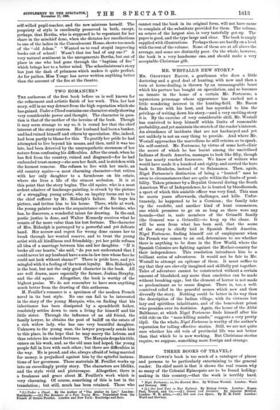MR. WESTALL'S NEW STORY.*
MR. GEOFFREY BACON, a gentleman who does a little doctoring and a good deal of hunting, with now and then a turn at horse-dealing, is thrown by an unmanageable beast which his partner has bought on speculation, and so becomes an inmate in the home of a certain Mr. Fortescue, a mysterious personage whose appearance has excited not a little wondering interest in the hunting-field. Mr. Bacon finds favour with his host, and has accorded to him the privilege of writing down his story,—and la very exciting story it is. By the exercise of very considerable skill, Mr. Westill has contrived to keep himself within limits of reasonable probability, and yet maintain the stretch of the reader's interest. An abundance of incidents that are not hackneyed and yet not unlikely is not an easy thing to provide. And where Mr. Westall approaches the marvellous he still retains, so to speak, his self-control. Mr. Fortescue, by virtue of some herb-elixir the secret of which he has learnt among the uncivilised Indians of South America, manages to look like fifty, though he has nearly reached fourscore. We know of writers who would have made it a hundred and eighty, and carried the hero back to Blenheim, instead of to Salamanca. Then, again, Nigel Fortescue's distinction of being a " hunted " man he owes to circumstances that are quite within the limits of possi- bility. Taken prisoner by a Royalist General during the South American War of Independence, he is hunted by bloodhounds, a sport of which this amiable officer was very fond. This man he meets years afterwards, challenges, and kills. Unfor- tunately, he happened to be a Corsican; the family take up the vendetta, and another kind of hunt commences, one which promises to go on as long as there were any hounds—that is, male members of the Grisoelli family (the General was a Griscelli)—to keep up the chase. It will be seen from what has been said, that the scene of the story is chiefly laid in Spanish South America. Nigel Fortescue, finding himself out of employment when the French war comes to an end, determines to see whether there is anything to be done in the New World, where the Spanish Colonies are fighting against the Mother-country for their independence. This resolution introduces him to a brilliant series of adventures. It would not be fair to Mr. Westall to attempt an epitome of them. It must suffice to say that they are cleverly imagined and skilfully put together. Tales of adventure cannot be constructed without a certain amount of bloodshed, any more than omelettes can be made without breaking eggs; but the element of horror is not made so predominant as to cause disgust. There is, too, a well- contrived relief in the peaceful scenes which now and then diversify the story. Nothing could be better in its way than the description of the Indian village, with its virtuous but lazy and spiritless inhabitants, and of the benevolent priest who presides over its destinies. Again, the house of the Abb6 Balthazar, at which Nigel Fortescue finds himself after his wild ride on the "man-killing nandu," suggests a very pretty idyll. On the whole, Nigel Fortescue is worthy of the author's reputation for telling effective stories. Still, we are not quite sure whether his old vein of provincial life was not better than that which he is now working. But Christmas stories require, we suppose, something more foreign and strange.


















































 Previous page
Previous page